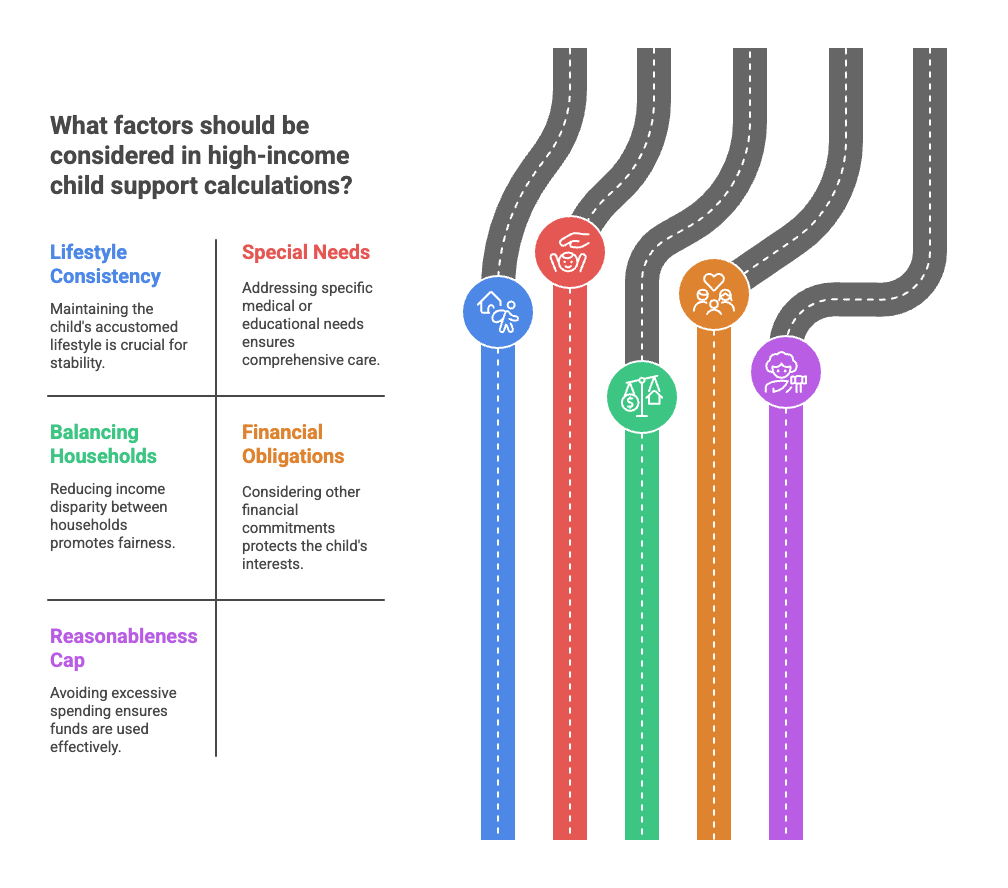- How Colorado Usually Calculates Child Support
- What Does "High-Income" Actually Mean Here?
- How Colorado Judges Approach High-Income Cases
- What Factors Make a Difference in These Calculations?
- A Realistic Example
- It's Not Always Smooth Sailing: Common Challenges
- Why Having an Expert Team Matters
- Looking Ahead: Future Adjustments and Unique Agreements
- Co-Parenting and Money: Why It Pays to Cooperate
- Balancing Fairness and Needs in High-Income Support

When it comes to child support, many folks picture a straightforward math problem: add up the incomes, plug numbers into a formula, and boom, there’s your monthly payment. But what happens when the parents involved earn far more than the usual range? That’s when things get a bit trickier, especially here in Colorado.
Colorado has clear child support guidelines meant to cover the bulk of cases, but those guidelines hit what you might call a “ceiling” for high-income earners. Beyond that, there’s no fixed formula, and courts have to put on their thinking caps to figure out what’s fair. The goal is simple: make sure the child’s needs are met without ordering up an excessive amount that doesn’t really benefit the kid.
Sounds a little complicated, right? That’s exactly why having an experienced legal team, like we have at Denver Divorce Attorneys, makes all the difference. Let me walk you through how Colorado handles high-income child support, why the guidelines only go so far, and how we help families navigate this often confusing territory.
How Colorado Usually Calculates Child Support
First off, here’s the basic picture. Colorado uses what’s called an income shares model (this is actually in the Colorado Revised Statutes, specifically C.R.S. §14-10-115). The idea behind this model is to assume the child should receive the same share of parental income they would have if the parents still lived together.
It takes a few key pieces into account:
- How much each parent makes (gross income)
- The number of kids needing support
- Extra expenses like daycare or health insurance
Based on these factors, the state puts together a schedule, a handy chart, that tells you roughly how much support to expect at various income levels.
For most people, this works great. As income goes up, so does child support, because, naturally, children have higher needs when the family income is higher. But here’s the catch: the schedule only goes so high. At some point, the numbers stop increasing, no matter how much the parents earn.
What Does “High-Income” Actually Mean Here?
“High-income” is a bit of a moving target, but typically, Colorado’s child support guidelines max out at combined monthly incomes around $30,000 or so (give or take). Once parents earn more than that together, the schedule doesn’t spell out any specific figures.
So what happens next? Instead of plugging numbers into a neat formula, judges get to make judgment calls. That means looking at the actual needs of the child rather than relying on a set percentage of extremely high incomes.
Now, I know what you’re thinking, “how does the court know what the child really needs?” That’s a great question, and in our experience, it often boils down to looking beyond basics like food and shelter, because at this point, those are pretty much covered. The court focuses more on lifestyle items, think private school tuition, extracurricular activities, travel, maybe even a nanny.
How Colorado Judges Approach High-Income Cases
Here’s where child support cases with high incomes start to feel more like art than science. Judges begin with the guideline amount at the cap and then consider what makes sense from there.
They want to keep the child’s standard of living consistent with what they had before the divorce, which can be a fine balancing act. For example, if the kid was used to summer camps, music lessons, or international vacations, those things might be included in the support order.
But, and this is important, the court also keeps an eye on fairness. The court won’t just order an unlimited sum because one parent has a big bank account. The goal is to meet the child’s reasonable needs, not to fund a luxurious lifestyle that doesn’t actually benefit them.
Each case is unique, and judges weigh things like:
- Detailed child budgets
- The lifestyle the child has been accustomed to
- The financial situations of both parents
Plus, they have discretion to deviate from the guidelines if sticking to the schedule would be “inequitable, unjust, or inappropriate.” So, outcomes vary quite a bit.
What Factors Make a Difference in These Calculations?
Here’s a quick rundown of what courts tend to look at when deciding high-income child support:
- Lifestyle and standard of living: Maintaining a child’s accustomed lifestyle is a big deal. If the kid was used to a certain kind of neighborhood, activities, or travel, courts try to keep things consistent, as much as possible.
- Special needs: Sometimes a child has specific medical or educational needs that require extra funds. High earners are generally expected to cover these fully.
- Balancing households: Courts might try to narrow the gap if one parent has a much higher income, making sure the child isn’t living in drastically different conditions between households.
- Other financial obligations: If the high-income parent supports other children or a new spouse lavishly, the court may factor that in to protect the child from the prior relationship.
- Reasonableness cap: There’s a tacit understanding among judges that “more” isn’t always better. You might have heard of the “Three-Pony Rule” floating around, it’s a way to say that after a point, more money doesn’t improve a child’s life. Judges want to avoid awarding spending that feels excessive or punitive.

A Realistic Example
Let me share a simple example to make this clearer.
Say you have two parents with a combined monthly income of $50,000, that’s well past the guideline charts. Maybe the standard “max guideline” figure for monthly child support in this scenario is $10,000.
But the actual costs for the child, private school tuition, nanny, extracurriculars, add up to $12,000 a month. So, the judge might order support close to that figure, rather than some arbitrary percentage of the total income, making sure the child’s real expenses, and a reasonable lifestyle margin, are covered.
It’s about fitting support to reality, not just numbers on a spreadsheet.
It’s Not Always Smooth Sailing: Common Challenges
High-income child support cases come with their own set of sticky issues. It’s totally normal if you’re feeling overwhelmed or worried.
For instance, the parent who pays might believe the other is pushing for an unreasonable amount simply because there’s money to be had, a “gold-digging” concern that pops up quite a bit. On the flip side, the parent receiving support often argues that because the other parent has so much wealth, the child deserves to benefit accordingly.
Then there’s the privacy angle. High earners might be business owners or public figures who don’t want their financial details aired in public court records. This concern often motivates folks to settle out of court, or seek special orders to keep records sealed.
Navigating these emotions and complexities requires a steady hand.
Why Having an Expert Team Matters
This stuff isn’t guesswork, it’s intricate. That’s why we lean heavily on our experience here at Denver Divorce Attorneys whenever we take on a high-income child support case.
- We have deep knowledge of Colorado family law and understand how judges in Denver and around the state typically handle these situations.
- We know what kind of documentation will hold water, budgets, expert testimony, lifestyle evidence, you name it.
- Most importantly, we’ve been in the trenches. April D. Jones leads a seasoned team with over 175 years of combined experience. That’s not just a number, it’s years spent fighting for families and making sure child support orders are fair, thorough, and workable.
As we like to say on our website, “We aggressively pursue your best interests,” which means we don’t just crunch numbers, we fight for balanced results that protect both your rights and your child’s future.
Looking Ahead: Future Adjustments and Unique Agreements
In many high-income cases, monthly child support is just one piece of the puzzle. Parents often agree to pay for big-ticket expenses separately, like:
- Private school or college tuition
- Summer camps or special programs
- A vehicle when the child reaches driving age
Sometimes orders even include provisions to adjust support based on bonus income or fluctuating earnings, a step-up here, a step-down there. These nuances take some careful legal drafting, but they can save a lot of headaches down the road.

Co-Parenting and Money: Why It Pays to Cooperate
Let’s be honest, when money is no object, fights over child support sometimes turn into battles over principle or emotion. That’s why we try to help parents focus on something more important: the child’s well-being.
Good communication and transparency about how support funds are used can go a long way toward easing tensions. When parents see they’re working together for the kid’s best interest, it doesn’t just make the process smoother, it builds trust, which is priceless in the long term.
Balancing Fairness and Needs in High-Income Support
Child support for high earners isn’t as simple as “x% of income.” In Colorado, once you pass the guideline caps, it’s all about fairness, actual needs, and preserving a child’s reasonable lifestyle.
These cases can feel complex, no doubt about it, but with an experienced team like Denver Divorce Attorneys by your side, you can navigate the process confidently. From carefully documenting your child’s lifestyle to negotiating creative solutions, we’ve got the know-how to help you get results that truly work.
If you’re facing a high-income child support situation in Colorado, don’t go it alone. Reach out to us at Denver Divorce Attorneys, “with 175 years of combined experience, you can trust our team knows Colorado family law inside and out.”
We’re here to help you protect your child’s future with smart, fair, and personalized legal guidance. Let’s work together to find the right balance, for your family, your peace of mind, and what matters most: your child’s well-being.
Ready to talk? Contact Denver Divorce Attorneys today to schedule a consultation and see how we can support you through your high-income child support case.